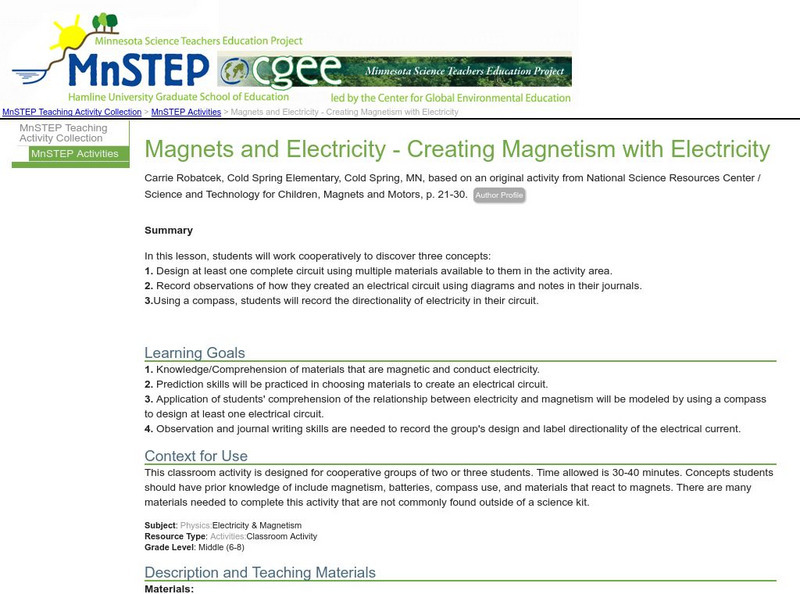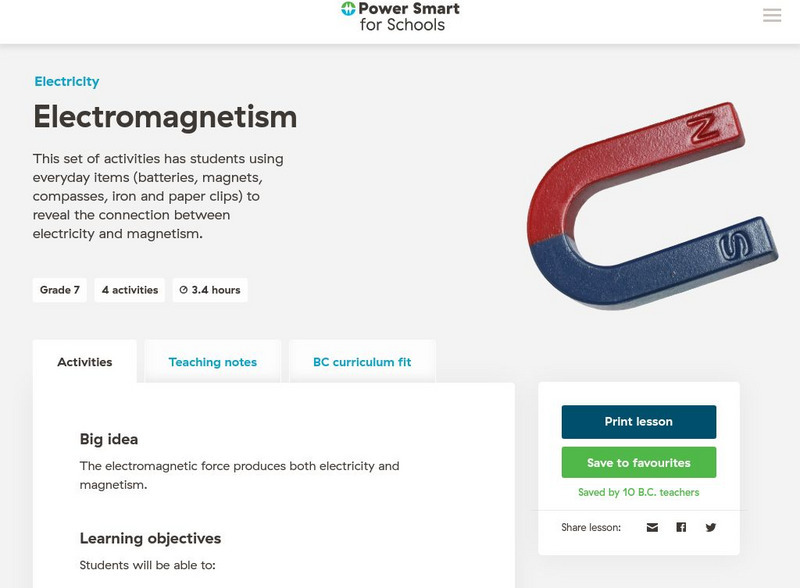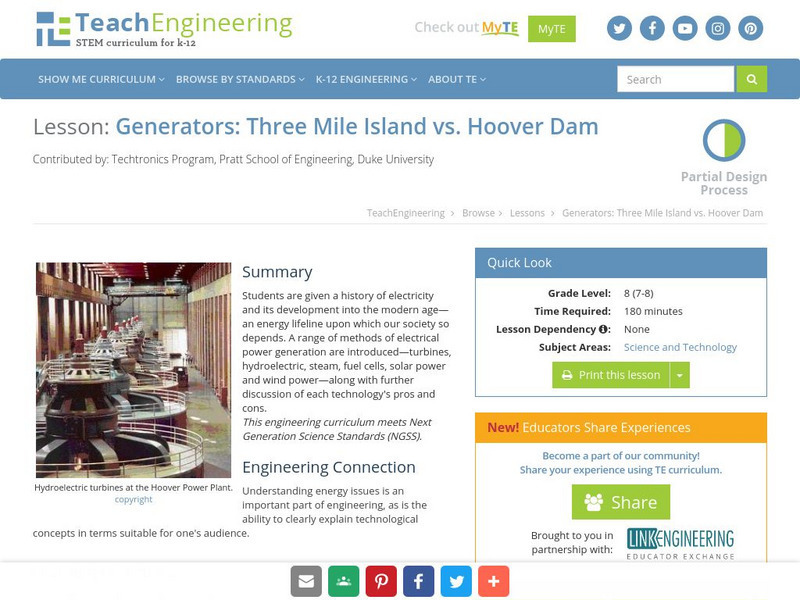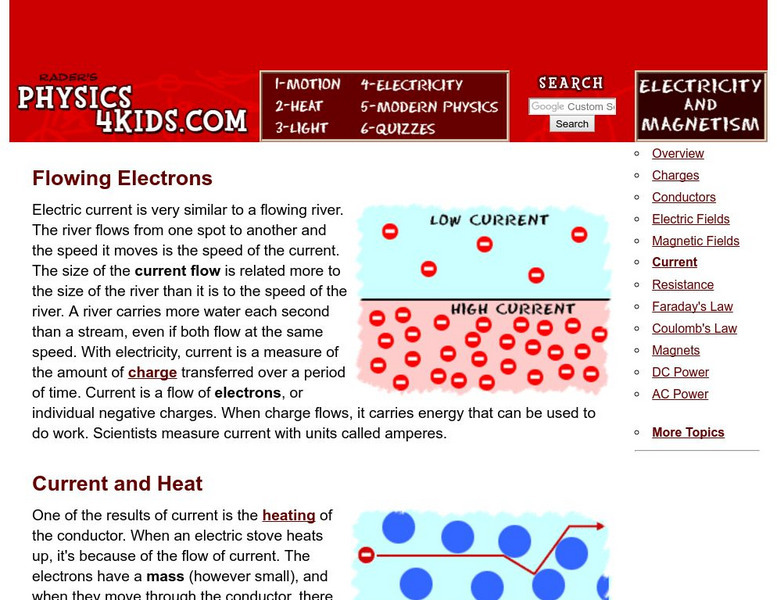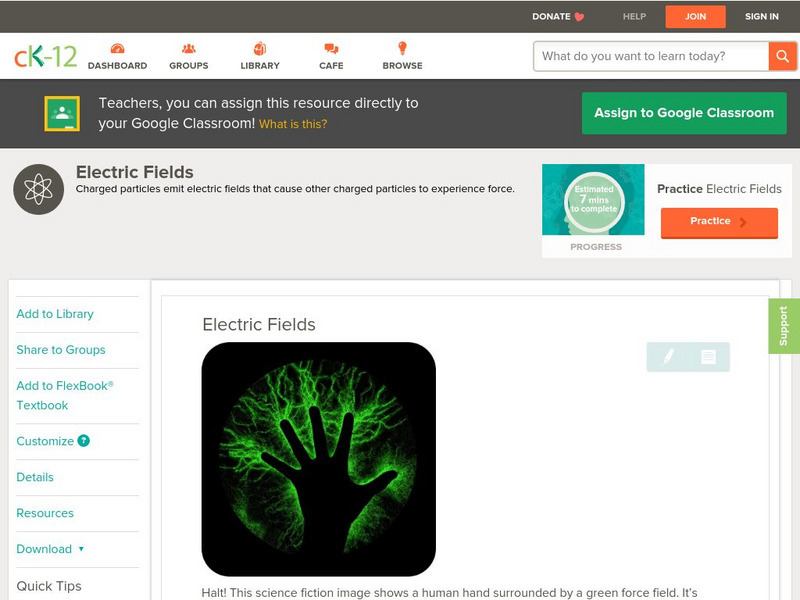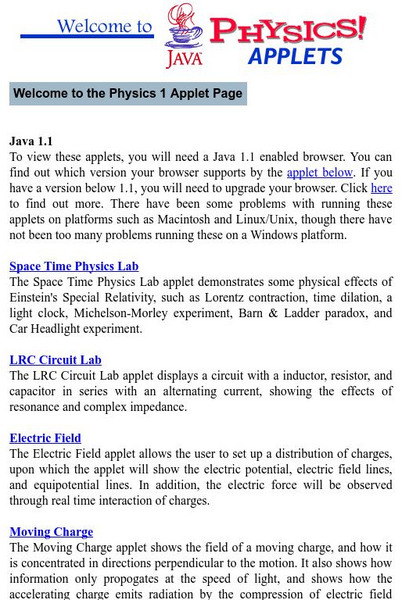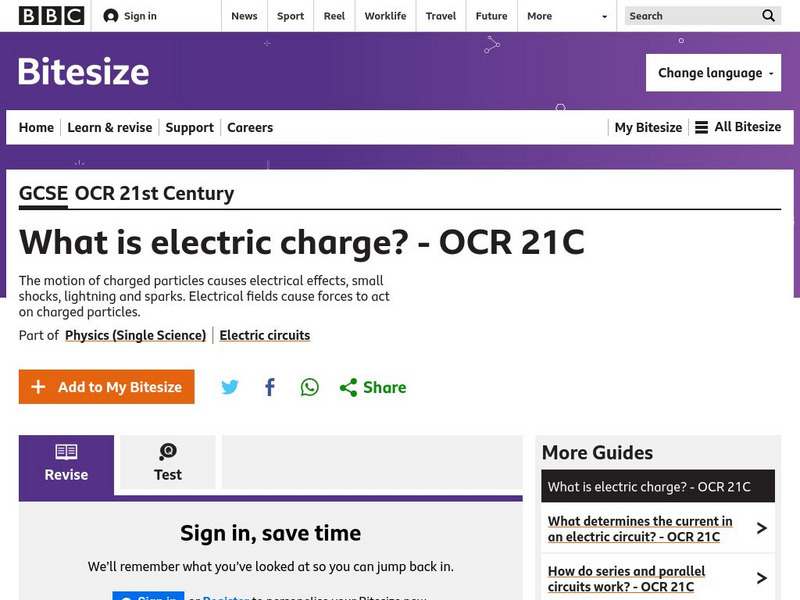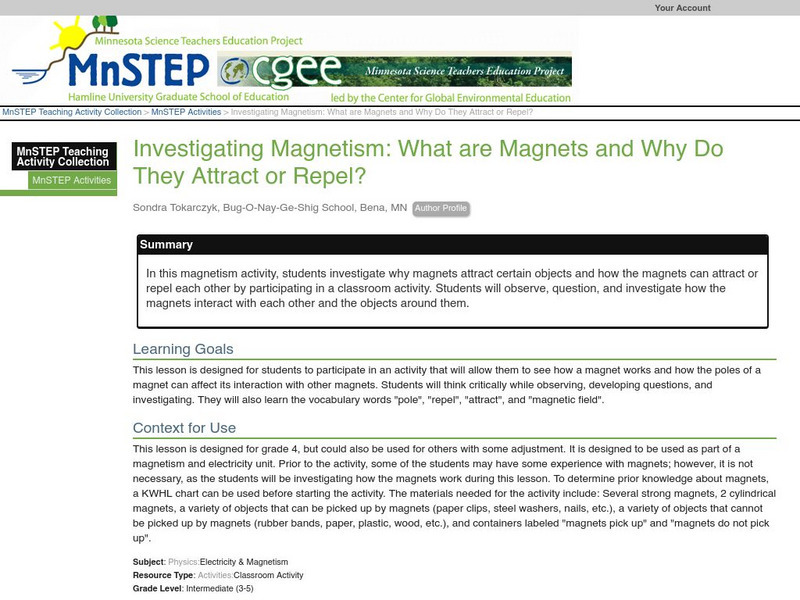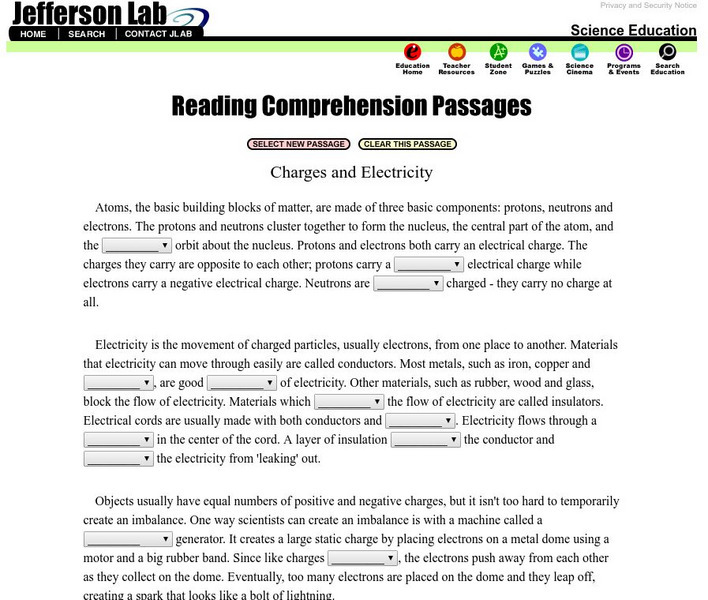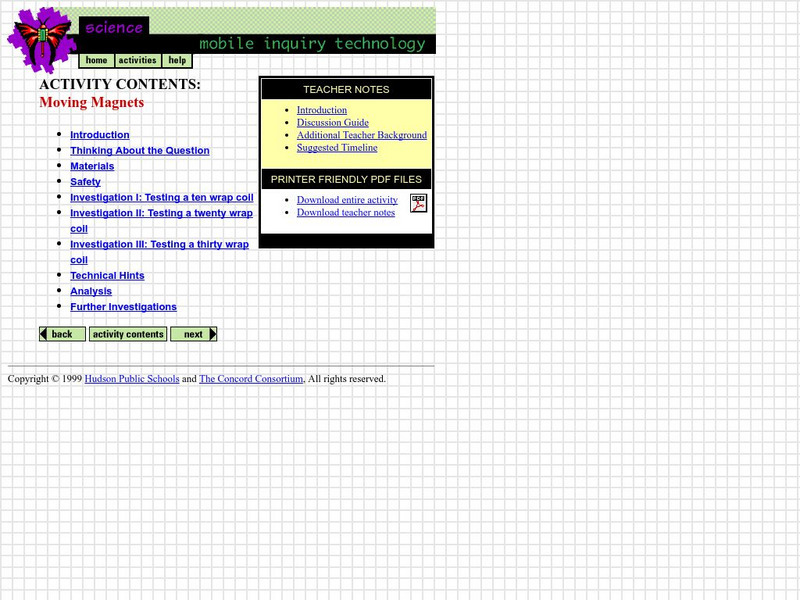Hi, what do you want to do?
Science Education Resource Center at Carleton College
Serc: Magnets and Electricity: Creating Magnetism With Electricity
Students will work in small groups to design at least one complete circuit using multiple materials. They will record their observations of how they created an electrical circuit using diagrams and notes in their journals. Using a...
Other
Bc Hydro: Power Smart for Schools: Electromagnetism
This set of activities has students using everyday items (batteries, magnets, compasses, iron and paper clips) to reveal the connection between electricity and magnetism. Ideally, students will already have experience building simple...
TeachEngineering
Teach Engineering: Whose Field Line Is It, Anyway?
Students teams each use a bar magnet, sheet of paper and iron shavings to reveal the field lines as they travel around a magnet. They repeat the activity with an electromagnet made by wrapping thin wire around a nail and connecting...
PBS
Pbs Kids:activities and Videos: Electricity
This PBS site offers videos and activities are hands-on challenges that focus on the engineering design process. They use simple materials, allow for multiple solutions, and are ideal for ages 9-12.
Other
Magnet Lab: Physics Lessons by Science Joy Wagon
These physics lessons and tutorials are designed to be a resource for learning introductory level, algebra-based physics. Organization is by topic, but a search option is available for quickly finding specific information. Although most...
TeachEngineering
Teach Engineering: Generators: Three Mile Island vs. Hoover Dam
Students are given a history of electricity and its development into the modern age lifeline upon which we so depend. The methods of power generation are introduced, and further discussion of each technology's pros and cons follows.
Physics4kids
Physics4 Kids: Electricity and Magnetism: Current
Explains electric current, how it produces heat, and the difference between a direct current and an alternating current.
National High Magnetic Field Laboratory
Magnet Academy: William Gilbert
William Gilbert was an English physician and natural philosopher who wrote a six-volume treatise that compiled all of the information regarding magnetism and electricity known at the time. The work included descriptions of many of...
Energy for Sustainable Development
Esd Bulgaria: Kids & Energy: Electricity
Electricity is the flow of electrical power or charge. It is a secondary energy source which means that we get it from the conversion of other sources of energy, like coal, natural gas, oil, nuclear power and other natural sources, which...
CK-12 Foundation
Ck 12: Physical Science: Electric Fields
Explore what an electric field is and how electric fields interact with this module. Module includes a video, interactive activity, and review questions.
CK-12 Foundation
Ck 12: Physics Simulation: Electric Analogies
[Free Registration/Login Required] Explore a different way of thinking about electricity as a way to become familiar with the concept of potential, current, and resistance using this interactive simulation. A PDF worksheet and a video...
Other
Bsi Education: Electrical Properties
The Applied Science resource consists of practical activities that demonstrate the importance of standard procedures in scientific work. Students examine electrical properties through a variety of activities. Some topics investigated are...
Science Education Resource Center at Carleton College
Serc: Investigating Electricity
For this interactive activity, students will explore electricity and be able to design and create a complete electrical circuit. Students will also learn what is necessary to light a light bulb. Creative thought, ideas, and,...
TryEngineering
Try Engineering: Flashlights and Batteries
Students work in teams to explore how a flashlight works. This activity examines the topics of batteries, electron flow, circuit systems, switches, and bulbs.
Ducksters
Ducksters: Practice Science Questions: Easy Electronics and Magnetism
Practice science questions on the subject of easy electronics and magnetism can be found on this website.
Ducksters
Ducksters: Practice Science Answers: Easy Electronics and Magnetism
Find the answers to the science quiz on the subject of easy electronics and magnetism on this site.
California Institute of Technology
Magnet Lab: Caltech Physics Applets
Although specifically designed for physics students at Caltech, anyone interested in learning more about electricity, magnetism or various other physical phenomena can benefit by exploring these interactive applets. A circuit tutorial...
BBC
Bbc: Gcse Bitesize: What Is Electric Charge? Ocr 21 C
This lesson focuses on electric charges. Electric current is the flow of electric charge. Some insulating materials become electrically charged when they are rubbed together. A substance that gains electrons becomes negatively charged,...
Science Education Resource Center at Carleton College
Serc: Investigating Magnetism: What Are Magnets and Why Do They Attract or Repel
In this magnetism activity, learners investigate why magnets attract certain objects and how the magnets can attract or repel each other by participating in a classroom activity. Students will observe, question, and investigate how the...
Texas Instruments
Texas Instruments: The Magnetic Field in a Slinky
Students use a Magnetic Field Sensor to measure the magnetic field and the current in a solenoid. They explore factors that affect the magnetic field, study how the field varies in parts of the solenoid, and determine the permeability...
Other
Easyphysics: Chapter 11 Electric Forces
Learners investigate electric forces. Some topics examined are conductors, Coulomb?s law, and net electrical charge. The resource includes example problems with solutions and a chapter quiz.
Thomas Jefferson National Accelerator Facility
Jefferson Lab: Reading Passages: Charges and Electricity
Read and fill in the blanks of this passage explaining charges and electricity. Each blank has a dropdown menu with choices. When you finish, click CHECK MY ANSWERS. If you pick a wrong answer, the right answer will be displayed along...
TeachEngineering
Teach Engineering: The Good, the Bad and the Electromagnet
Using plastic straws, wire, batteries and iron nails, student teams build and test two versions of electromagnets-one with and one without an iron nail at its core. They test each magnet's ability pick up loose staples, which reveals the...
Concord Consortium
Mobile Inquiry Technology: Moving Magnets
This investigation has students examining how electric and magnetic charges are related. They will look at how an electric current is affected by the proximity of a magnet.





